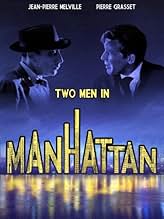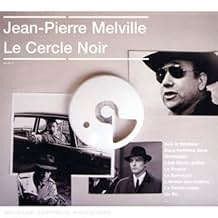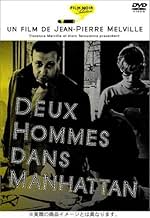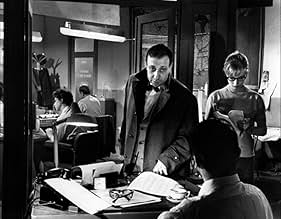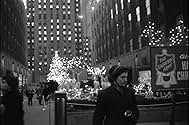Deux hommes dans Manhattan
- 1959
- Tous publics
- 1h 24min
Un délégué français à l'ONU s'est volatilisé, le journaliste Moreau (Jean-Pierre Melville) et le photographe Delmas (Pierre Grasset), gros buveur, sont envoyés pour le retrouver. Leur seule ... Tout lireUn délégué français à l'ONU s'est volatilisé, le journaliste Moreau (Jean-Pierre Melville) et le photographe Delmas (Pierre Grasset), gros buveur, sont envoyés pour le retrouver. Leur seule piste : une photo de trois femmes.Un délégué français à l'ONU s'est volatilisé, le journaliste Moreau (Jean-Pierre Melville) et le photographe Delmas (Pierre Grasset), gros buveur, sont envoyés pour le retrouver. Leur seule piste : une photo de trois femmes.
- Réalisation
- Scénario
- Casting principal
- Bessie Reed
- (as Michele Bailly)
Avis à la une
When the story arrives, it's revealed to be an ethical dilemma: our two principals (Melville as an Agence France Presse journalist and Pierre Grasset as his photographer buddy) discover a French diplomat and ex-Resistance hero dead of a heart attack in an actress's apartment. Do they report the truth, cover it up to preserve the guy's reputation or sensationalise it even more to make a fortune from the exclusive?
Melville was by no means a great actor, but his baleful eyes, bland smile and spiffy bow tie in this film give him a kind of sleazy charm that brings to mind Peter Lorre. His character's name (Moreau) is a pun on "moraux", which means moral, and indeed he is intended to be the moral centre of the film. There are moments, though, when he seems genuinely sinister: when he peeps on a bare-breasted dancer in her dressing room (the scene was censored in the UK), and when he looms threateningly over another girl who has just attempted suicide.
"Deux hommes..." is the most New Wave of all Melville's films. The raw, documentary-style shots, the improvised feel to some of the scenes (Melville makes frequent mistakes when speaking English), the use of real locations and untrained actors (including Melville himself), were jarring to audiences and critics at the time. In the light of Godard and Truffaut we can now better appreciate the type of film-making that Melville helped to inaugurate. Nevertheless, Melville regarded "Deux hommes..." as a failed experiment, returning in his subsequent films to a more classical approach.
Jean-Pierre Melville filmed both a Noir love letter and, almost a time capsule video documentary of 1958 New York City. From the opening bars of the jazzy score and Googie style credits that run over a wonderful (looking out the back window of a cab) trip down through traffic, a traffic of tail fin adorned cars, traveling South along Broadway, and then on 7th Avenue right through the heart of manically lit Times Square you know you are in for a special visual treat.
Melville's New York is the real deal. Its not some Hollywood back lot dressed up like New York City. Melville's New York is a dreary smoggy winter sky New York. The old New York that belched black coal smoke by the ton into the atmo, a New York of steaming manholes in streets that were choked with Buses and Checker Cabs. Melville's New York was a Holiday Day New York festooned with Christmas decorations two days before December 25th.
Two journalists become de facto detectives tracking down a missing diplomat through the underside of New York.
Pierre Grasset is great as the smart-alek Delmas his picaresque portrayal is very effective playing against Melville who is relatively somber. The film has but few flaws, probably the most notable for me are the interior shots of the E.D.D.I.E. whorehouse, the actresses playing the hookers seem to be speaking English phonetically, and ditto for the stripper Bessie Reed or she may just be dubbed. The excellent soundtrack is by Christian Chevallier and Martial Solal. 8/10
Two Men In Manhattan is available on DVD from Cohen Films it's in French with English subtitles.
Said to be a combination of American film noir and the budding French New Wave movement, Two Men in Manhattan very neatly utilizes the good sides of both styles. The urban street views and skyscrapers look excellent in the glow of the bright ad signs on store marquees and the dark, stark lighting set up for interior scenes is a joy to the eye too. The laid-back jazz soundtrack is highly enjoyable, creating a mood softer than in hard boiled detective noirs, even though the seedy locations would fit in such flicks seamlessly as well.
A lot of the film's charm lies on the shoulders of the two protagonists, who suit their roles splendidly. Melville's sad-looking appearance matches his character's melancholic but righteous attitude perfectly, while Grasset makes a great pairing for him as the greedy and amoral Delmas, prone to drinking and sleeping around. Ultimately their opposing approaches to the ethics of journalism are what create one of the main themes of the film; namely, examining the responsibility of the press when publishing stories of delicate nature. Besides the lead duo, the supporting actors do a good job too, from a suicidal stage actress Judith Nelson (Ginger Hall) to a jaded cabaret dancer Bessie Reed (Michèlle Bailly) and a jazz singer Virginia Graham (Glenda Leigh) who we get to see recording a haunting song in a studio.
All in all, when a film successfully combines a totally smooth and cool atmosphere with suspense and humour like Two Men in Manhattan does, it just cannot be anything but highly enjoyable. The movie is simply thoroughly entertaining, but since the technical elements are also very skilfully created, there is no reason to skip this one if you're even remotely interested in film noir and French cinema.
Finally, about a quarter hour in, Melville goes to the apartment of his cameraman, Pierre Grasset, and the wallpaper outside his apartment was poorly hung. Aha! I thought, a creature of the demi-monde, someone who cuts corners, was looking out for himself, who had pictures of the young women that the diplomat.... associated with. Off they went into the night, still followed by a mysterious trailer: Melville, the moral reporter, and Grasset, the corrupt guide. I knew they would find their prey; but how moral would Melville be and how corrupt Grasset? And who was following them and why? Who was the hero of this story and exactly what was the Great White Whale they were following?
This movie is Melville's own personal fantasy, set in a fantasy New York glamorous beyond belief to anyone who has dwelt in the real one. He had been born Jean-Pierre Grumbach, and had adopted a new surname in admiration of Herman Melville. He had played Bartleby and written and directed his own movies and now was going on his own voyage to find out if he could be the hero of his own tale.
Le saviez-vous
- AnecdotesThe first credited acting part for director Jean-Pierre Melville.
- Citations
The Singer: [sings] There's a street in Manhattan / With a house that has no windowpanes / And the lamp that burned all night / Listen man, go away from me / I lived there so long ago / With a guy you wouldn't care to know / God it's cold here / Nothing good here / Go man / Not tonight
- ConnexionsFeatured in Keeping Up Appearances (2013)
Meilleurs choix
- How long is Two Men in Manhattan?Alimenté par Alexa
Détails
Box-office
- Montant brut mondial
- 2 527 $US
- Durée1 heure 24 minutes
- Couleur
- Mixage
- Rapport de forme
- 1.37 : 1


